- Home
- Sam Siciliano
The Grimswell Curse Page 11
The Grimswell Curse Read online
Page 11
Holmes laid his long fingers on her wrist. “I shall help her.”
She sniffled again. “Someone needs to look after the poor silly fool, the great ninny.”
“What about her aunt?” I asked.
Mrs. Fitzwilliams’s jaw stiffened, even as she sat straight up and let the handkerchief fall. “What about her? Who asked her here? Tell me that, young man, tell me that!”
“Madam, I only—”
“It wasn’t me, I can tell you. And she’s no aunt—she’s hardly a blood relation. If poor Agnes hadn’t died as a child, she would be a real aunt. Lord Grimswell didn’t ask Constance—he never wanted her around. He kept her away except for a few days a year. If it was me, I’d send her packing, but William is the polite one. She’s a Grimswell, he says. Well, Reginald Grimswell—that accursed one—was a Grimswell, too, and I wouldn’t have him under my roof. Trying to tell cook and me what should be on the menus! Her and that George, they... I’m not dead yet, and until I am, I’ll run this house, not some bossy big horse who—”
“She did not arrive until after your master’s death?”
She nodded. “You have that right, and then she moves in for good. Rose could throw her out, but the old hag has her completely cowed. Blood isn’t everything, Mr. Holmes—not always. And Constance is not an aunt, not a sister. Her father was Lord Grimswell’s uncle. Maybe you can tell me what that makes her—it is not an aunt.”
“You are correct. Lord Grimswell and Constance would have been first cousins. If Constance or Jane had had children, they would have been Rose’s second cousins. I don’t know what exactly the relationship between Rose and Constance would be.”
The old woman’s mouth was a taut, curved line of disapproval as she nodded. “Not an aunt—hardly an aunt. Hardly a blood relation at all.” She sighed. “I should not let her annoy me so. It isn’t Christian—but she’s no Christian either. I... I do worry about Rose, Mr. Holmes. I do.”
“That’s natural,” I said.
“I was nearly sixty when she was born. Her mother was a good woman, very sweet-tempered, but the poor girl died before she was even thirty. Rose was only two. She was a pretty child and always a big one, just like her father. She was taller than me when she was ten years old. It was hard when I was already so old, but I never had a child of my own. William and me...” Her voice died away. She had the handkerchief in her hand again.
Holmes hesitated, then set his hand on her wrist again. I knew he would have been much more reluctant to touch a younger woman. Her mouth twitched into a feeble smile. “Forgive me. I get so weary with it all. Why should some people live so long—too long—while others...? Oh, I have work to do.” She put her handkerchief into a pocket, seized her cane and struggled to her feet.
Holmes and I stood. “Thank you,” he said. “We must talk again soon. I have a few more questions.”
She smiled, her black eyes still smoldering. “I’ll be here. I’m not going anywhere. Except to the grave. I suppose the good Lord must know what he’s doing.” She sighed again, then started for the door. “He’d better.”
I could see that she had severe arthritis. The movement we took for granted must be a torment for her. She had nearly reached the door when it swung open, and Rose Grimswell stepped into the room. Although both wore black, the contrasts were striking: besides youth and age, there was the difference in size. Rose was over a foot taller, her back unbowed, her shoulders broad and strong, her face unlined, her hair black not white.
Rose smiled. “Good morning, nanna.” She looked much better. Her cheeks had some color, and her blue-gray eyes were not so haunted.
“It’s time you were down, girl. It’s after nine.”
Rose’s smile faltered. “I know, but—”
“Eat your breakfast—eat a good breakfast. You’ve been eating like a bird, and that won’t do. You’ll make yourself sick.”
Rose watched her leave, then smiled at us. “Good morning.”
I smiled. “You slept well.”
She smiled back. “Is it that obvious?”
“Yes.”
“I did have a wonderful sleep. I was restless at first... I had the most curious dreams.” Her eyes shifted briefly to Holmes, then back to me. “You were in one, doctor.” She frowned slightly, even as a faint flush showed at her cheekbones. She turned abruptly toward the sideboard. “Oh, I am starving.”
Holmes said nothing, but a faint flush also colored his cheeks.
I took a sip of coffee. It was cold. Outside I could see the wind moving the bronze leaves of the trees. Rose sat down next to me. On her plate were a muffin, three pieces of bacon, a slice of ham, a piece of kipper, some stewed tomatoes, fried potatoes, buttered toast, and a huge mound of scrambled eggs.
She noticed me regarding the plate, and the flush began again. “I suppose it seems rather greedy, but...”
I shook my head. “Not at all. Not if you have not eaten a big meal in a while. Michelle also has a hearty appetite. After all, you are not... a tiny woman.”
Her mouth drew into a smile. “No, I am not.” Her eyebrows were black and thick, her eyes clear and lucid, the blue more noticeable in the bright morning light. Her black hair was parted down the middle and pulled up into a tight bun, the tops of her ears hidden. She raised the sterling fork and cut off a piece of bacon.
“I am happy to see you looking so much better,” Holmes said.
She smiled briefly and continued eating. A heavy silence seemed to settle over the room. I stood up. “I shall have a bit more coffee.” I poured from the silver pot. “Your Mrs. Fitzwilliams is a formidable lady.”
Rose nodded. “She is. She will be eighty in another year. She and William are... sweet, in their own way, although she has become so old and bitter in the last year or two. Her rheumatism hurts her so. She can hardly move any longer. When I was little, she was all over the house, everywhere, it seemed, and now... It must be hard for her.”
I wondered what Rose Grimswell would look like as an old woman—not like Mrs. Fitzwilliams. Their physiques were so different. Would she be sitting at this table with an elderly Digby? A horrible thought, that. Or would she live that long? I had seen women her age laid out cold and dead, their limbs like gray-white marble, their faces waxen and pinched. She was so young, strong and alive, such a vital presence, but she could still die. I hoped Holmes was mistaken, but I knew he was not. Someone, or something, was pursuing her—blighting her young life. I could feel it, and the morning sun suddenly seemed a feeble thing.
I sipped my coffee, then eased out my breath. Frightening myself half to death would not help matters. Grimswell Hall was a gloomy place, and being away from Michelle made me morose. Yes, Mrs. Fitzwilliams was right when she warned about letting one’s thoughts run away with themselves.
“I would like to take a walk on the moor,” I said.
Rose smiled. “So would I.”
Holmes nodded. “A stroll would be agreeable.”
“I used to like to ride on the moor,” Rose said.
“You are an equestrian?” Holmes asked. “I would not have expected it.”
She pushed aside a bit of tomato, then speared a potato. “I would not say I was exactly an equestrian, but I have always liked horses. I took riding lessons and had my own horse for a while. I loved galloping on the moors.”
“Did your father like horses?” Holmes asked.
She thought for a moment. “Not particularly. He had a cat he liked, a big black one named Melmoth.”
Holmes’s laugh was akin to a snort. “A clever name. Are you familiar with Melmoth, the Wanderer, Miss Grimswell?”
She nodded, but I said, “Well, I am not.”
“Melmoth was a fictional character similar to the Wandering Jew or the Flying Dutchman.” Holmes reflexively drew out his cigarette case, realized one did not smoke before young ladies, and slipped it back into his coat. “I wish I could have met your father, Miss Grimswell.”
“I think you would have
liked him.”
Holmes tapped lightly at the table. “Miss Grimswell, I dislike reminding you, but Lord Frederick is arriving today. Before he does, I would like to speak with you about what is troubling you.”
Her muted smile faded, and something weary showed in her eyes. “Very well, Mr. Holmes. I am ready, but... might I finish my breakfast first?”
Holmes shook his head. “Forgive me, miss—I should have given you a moment’s peace. I have been inconsiderate. I can only ask your pardon and plead my concern for your well-being.”
She set down her fork and shook her head. “There is nothing to forgive. I only...” She stared out through the window. “If you do not speak a bad thing—if you do not say it aloud—you can pretend it does not exist. I have pretended long enough. The truth cannot be denied.”
“Let it wait a little longer. Perhaps we could discuss the situation while we are walking on the moor.”
She gave a relieved sigh. “That would be better.” She picked up her toast and put orange marmalade on it. Her blue eyes regarded me. “Doctor, you—you are coming, are you not?”
“Certainly.”
“Good. I shall want to know...” A frown had creased her brow.
“There must be only cheerful and serene thoughts at the breakfast table,” I said.
The door opened and Fitzwilliams appeared. Rose was preoccupied, but I noticed he was pale. “Could I see you for a moment, gentlemen? I... It will not take long.” His voice was controlled, but with a quaver beyond that of age.
Holmes stood. “Certainly. That will allow Miss Grimswell to finish her breakfast.”
She smiled up at us. “I shan’t be long.” And indeed, little remained on her plate.
We followed Fitzwilliams into the hallway, where he pulled a handkerchief from his pocket and wiped at his face. “There has been... How shall I ever tell her?”
“What has happened?” Holmes asked.
He licked his lips, then raised his arm and gnarled hand. “See...” He let it drop. “He will tell you.”
“Very well.” Holmes turned, then turned again. “Oh, before I am distracted, I have a request for you, sir. Would you send someone to Grimpen and arrange for a locksmith to visit here this afternoon? It is a matter of urgency. I want the door to Miss Grimswell’s room adequately secured.”
Fitzwilliams licked his lips, then nodded. “I shall see to it, Mr. Holmes.”
“Thank you.” Holmes strode forward, and I followed. Near the entranceway was a young man, his face grim. He wore a battered tweed jacket, heavy leather breeches and muddy rubber boots. He was not over six feet tall, but he was one of the broadest men I had ever met, his shoulders, chest and neck massive. His face was reddish-brown from the sun with a smattering of freckles, his thick, light brown mustache hiding his upper lip. One brawny hand held a gray cloth cap, and under his other arm was a bundle.
“Good morning, gentlemen.” His voice was soft but curt.
As Holmes surveyed him, his lips drew back in dismay, but he recovered at once. “Good day,” he said. “I am Sherlock Holmes, and this is my cousin, Doctor Henry Vernier.”
He stared more closely at me, then smiled faintly. “I too am a doctor. John Hartwood is my name.”
My eyes again took in the worn clothes, the lack of bag and his rugged physique. “Veterinary medicine?” I asked.
His smile vanished. “No. I am a medical doctor—people, not animals.”
My face grew warm. “Oh, forgive me—of course. I am used to Harley Street specialists and the like. In London we dare not be seen without our frock coats. It is the regulation uniform. Here in the country it must be quite different.”
“So it is.”
Holmes’s mouth had curved downward in disapproval as he regarded the thing under the doctor’s arm, but he did not speak. I smiled awkwardly. “We are visiting Miss Grimswell, and... Do you know Miss. Grimswell?”
He gave his head half a turn. “No.”
A spark of interest flared in Holmes’s eyes. “Did you know her father?”
“Yes. He was my patient. And my friend.” Hartwood managed to look grimmer still.
“But you have not yet met his daughter? You have settled in the area recently, doctor, perhaps in the last year or so?”
Hartwood’s blue eyes were suddenly hard. “How do you come to know that?”
“By your manner of speaking. You sound like a Dartmoor man who has spent some time abroad. Edinburgh?”
“Yes, but—”
“It could not have been London, and there is only a hint of a burr. Edinburgh is well known for its medical school. You would not have met Miss Grimswell because she has not been here at the hall much in the past year.” He shook his head. “An unfortunate way to have to meet a lady.”
Hartwood’s eyes opened wider, and his nostrils flared. I gave Holmes a puzzled look.
Holmes pointed at the bundle. “Where did you find the dog?”
My stomach gave a lurch as I realized what was in the bundle. The white cloth had reddish stains. “Not far from the hall,” Hartwood said. “Just past the trees. How did you know?”
“From the look on your face, Doctor Hartwood, from Fitzwilliams’s dismay, and from the size and the blood-stains.”
Hartwood shrugged. “Obvious.” He opened his mouth and sighed. “I was riding by. I didn’t know Miss Grimswell was here. It is a bad way to meet the lady, but then I don’t seem to have luck with Grimswells.”
“How did the dog die?”
“Something tore out its throat, a wild dog or fox.”
“May I have a look?”
“Certainly.”
Holmes set the bundle on a small table and unwrapped the cloth. The once-white fur was mostly a muddy brown, wet and matted, the tiny dog quite stiff, its eyes dull. Under the chin was a bloody mess which had stained the white fabric. “Something with quite a large jaw,” Holmes said. “Much bigger than a fox. A very large dog or wolf.”
Hartwood gave a gruff laugh. “No wolves on the moor, not for decades.”
“I know, doctor. Idle speculation on my part.”
Hartwood slapped his cap against his leather trousers. “I knew where it must have come from. Poor wee thing doesn’t belong on the moor. No place for toy dogs. Thought at first it was a puppy, but a fine lady in Edinburgh had a tiny dog like that one. Might do in the town, but not here. Hardly bigger than a vole. Almost anything could kill it—owl, adder, feral dog or cat, fox.”
“Fitzwilliams?” Rose Grimswell’s voice echoed across the hall.
Holmes quickly wrapped the cloth about the dog, then thrust it under his arm.
Hartwood saw the looks on our faces. “Oh blast,” he muttered. “We have to tell her.”
Holmes gave a reluctant nod. “I shall.”
“Are you sure?” I asked. “Perhaps it would be better to wait until...”
Hartwood shook his head. “No. Best have it done with. Even if...” His words trailed off as his eyes opened wide, his lips parting. He stared past me at Rose Grimswell.
“There you are!” she exclaimed. As she came closer, her pace slowed, her smile fading. “I was wondering what happened to you. Is anything the matter?” She raised her hand, hesitated, then touched her hair in back, and let her hand slip down.
Hartwood appeared to have been struck dumb, but his eyes were fixed on her. She was two or three inches taller than he, but he certainly outweighed her. His freckled hand with the reddish-blond hair on the the back was half again as broad as hers, although she had the longer fingers.
“This is Doctor Hartwood,” Holmes said. “He was in the neighborhood.”
“You are Doctor Hartwood?” He nodded but did not speak. “I thought... I thought you were much older. I did not know...” Her words trailed off, her blue-gray eyes suddenly curious, a faint flush appearing on her cheeks. “You are the Doctor Hartwood who treated my father?”
“Yes. I did want to come to his funeral, miss, but I was called away by
a very serious case. I felt very bad. I wanted to come.” He drew in his breath, swelling his massive chest. “I liked him, your father.” He tried to smile, but then his eyes shifted to Holmes, and his face grew grim again.
Rose was still smiling at him. “I know he valued your company, doctor. He mentioned you in his letters, but he did not say... I would not have thought...” Her flush deepened.
Hartwood looked positively anguished, and he turned to Holmes, who drew himself up. “Miss Grimswell, I am afraid something has happened to your dog.”
“My dog?” She was genuinely puzzled for an instant. “Oh, you mean Elaine. It has been so blessedly quiet I had almost forgotten... What has happened to her?”
Holmes looked at me, perhaps thinking a physician should have more practice at this type of thing. “There has been an accident,” I said weakly.
Her lips drew back in a brief, pained smile. “She’s dead, isn’t she?”
Holmes nodded. “Yes.”
She stared at him. “Let me see,” she said softly.
“I do not think that would be wise,” I said.
She thrust her jaw forward. “I want to see it. It is my right.”
Holmes looked at me, then at Hartwood. “Very well.” He set the bundle on the table again.
“Show me.”
Holmes pulled the towel back. Rose stared silently. Her arms were stiff and straight, her big white hands forming fists. “What...?” Her chest swelled. “What did this to her?”
“Probably a dog. A wild dog.” Hartwood had spoken, and she turned to him.
The tears started to fill her eyes just above the lower lids. “Poor hopelessly stupid little...”
“I’m sorry, miss, but Dartmoor is no place for such a little dog.”
“I know—I know. I tried to tell him. Of all the stupid...” Her voice rose even as the tears started from her eyes. Holmes wrapped the cloth about the dog. “It was not her fault,” Rose murmured, more to herself than us. “Everything I touch...”

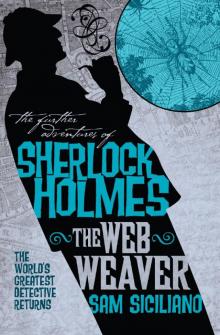 The Web Weaver
The Web Weaver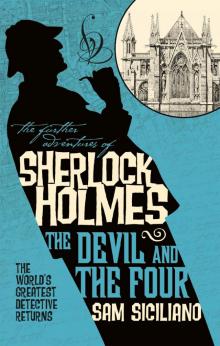 The Further Adventures of Sherlock Holmes--The Devil and the Four
The Further Adventures of Sherlock Holmes--The Devil and the Four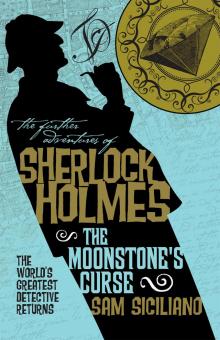 The Moonstone's Curse
The Moonstone's Curse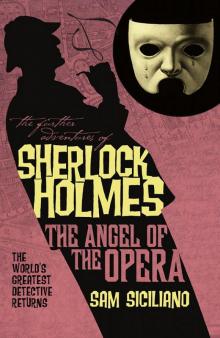 The Angel of the Opera
The Angel of the Opera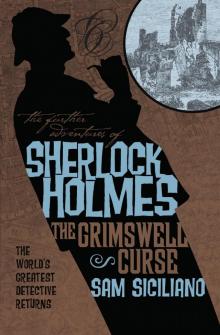 The Grimswell Curse
The Grimswell Curse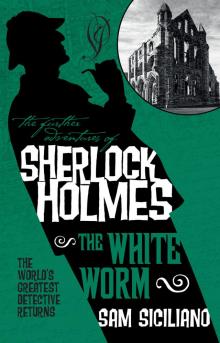 The White Worm
The White Worm